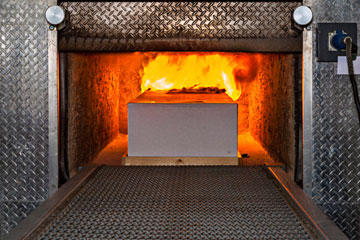
A body in the fire-based crematory oven of Lakewood Cemetery.
(6 of 8)
Inside Bradshaw's Celebration of Life center are two chapels, one with a grand piano and a dedicated family-respite area, another with a water wall. But the star of the show is the Resomator, a stainless-steel chamber that uses a combination of water, potassium hydroxide and heat to break down bodies into peptides, soaps, salts and sugars. In other words, it dissolves your every tissue and reduces your bones to fragile, gleaming white fragments that are pulverized just like flame-based cremains, except that the final product is more powdered sugar than campsite ash, and the watery substance simply goes into the wastewater-treatment system.
Many Americans are increasingly turned off by the idea of filling a body full of chemicals to slow down decomposition and then putting it into the ground inside a casket that's inside a burial vault that's inside a cemetery whose grounds will need to be watered and maintained in perpetuity. It should be no surprise that the embalming industry has been hard-hit over the past decade. According to the Bureau of Labor Statistics, the number of embalmers in the U.S. has dropped by almost half since 2005.
Trouble at the Crematory
As cremation has become more popular, sensational and almost unbelievable stories of errors and misidentifications have cropped up, none more horrific than the Tri-State Crematory incident in Noble, Ga., in 2002.
After hearing reports of scattered corpses and body parts near the crematory, federal agents investigated and found hundreds of bodies--334 total--thrown in holes, stacked in piles, in hearses and in all phases of decomposition. Authorities called it Stephen King--esque. Everywhere you looked there were bodies. The families had been given cement dust instead of remains.
Ray Brent Marsh, who ran the crematory, was charged with 787 felony counts. He pleaded guilty, was sent to prison for 12 years and was forced to write letters to relatives of the deceased. He has never explained why he did what he did, but it rocked the industry and, cremation supporters say, ultimately changed it for the better.
"That was a situation with a businessperson who was offering $125 cremations, and funeral homes were saying, 'Hey, that's a great deal,' and then not really visiting the crematory, not inspecting it," says CANA's executive director, Barbara Kemmis. In the aftermath of Tri-State, Georgia and other states passed stricter laws to tighten regulations allowing officials to better monitor crematories. Still, only four states require certification from organizations like CANA to operate one.
Nicodemus of Hollomon-Brown is one of a handful of experts who travel across the country certifying crematory operators through a CANA-sponsored course. But in many instances, the only training that operators get is either on the job from other operators or through a crematory manufacturer's representative.
David Charlip, a mortuary-and-funeral-law attorney based in Florida, has represented plaintiffs who sued crematories and funeral homes, most commonly for cremating the wrong body. Not surprisingly, he's highly critical of the industry.
